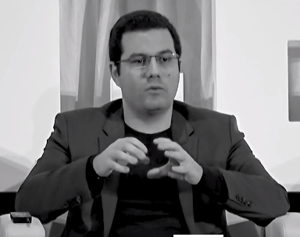-
Solution overview
Develop the technical skills that Fortune 500 enterprises and the public sector want.
-
U.S. Department of State (Cyber Advance for Women in MENA)
Build your skills and launch your career in Cybersecurity.
-
USAID Jordan (Tech for Jobs)
Increase your data analytics capabilities with this free program.
Mentorship Spotlight: Tharsis Souza, Two Sigma
In this blog series to commemorate National Mentoring Month, we are celebrating some of our incredible mentors in the Data Science for All program.
 Tharsis Souza is Vice President of Products at Two Sigma, and a mentor for DS4A / Empowerment. He answered a few questions for us about his experience, career advice and creating more inclusive workplaces.
Tharsis Souza is Vice President of Products at Two Sigma, and a mentor for DS4A / Empowerment. He answered a few questions for us about his experience, career advice and creating more inclusive workplaces.
Tell us about a pivotal moment in your career: what was the backdrop, what did you do, what did you learn?
In 2016, I was doing a PhD in Computer Science at University College London working with social media datasets and developing computational models to forecast financial markets dynamics. One day I was offered the opportunity to join a start-up in the Silicon Valley which worked in the AI / Knowledge Economy space as the first Product Manager (and employee) for what would then become the company’s Financial Services vertical. My challenge was to create the business from scratch and define not only the product roadmap but also create a business plan jointly with the CEO. During this period, I was lucky enough to have exposure to so many parts of the business, from forming and leading a team to dealing with investors, closing alliances with partners to designing, developing and selling products to some of the largest financial institutions globally. Although I had worked in large institutions before, this start-up experience was pivotal in my career as it has uniquely equipped me with invaluable business, technology and people lessons.
Who were your mentors and role models when you were starting out? What’s the best professional advice you received?
From my parents, I learned the importance of work ethic while my academic supervisors taught me the value of clarity. From my professional mentors, I learned how to lead without authority and from my colleagues, the value of diversity.
Have you gained from mentoring and coaching - both professionally and personally? Did anything surprise you when you started mentoring?
Mentoring has been a humbling experience. It is an opportunity to interact with a diverse group of people with fresh perspectives and ideas, which has always made me reflect on my own goals and improve awareness of my own learning gaps. I always leave mentoring sessions with refreshed curiosity and satisfaction from seeing others progress, particularly those from underrepresented groups such as the case for the DS4A / Empowerment program.
Can you give us an example of how data skills are increasingly needed in your role and business?
In our day-to-day work we deal with vast sets of data, from tens of thousands of diverse sources. Everything we do is guided by the scientific method and investment in people, technology and data is what makes our scientific approach possible.
You’ll be mentoring a group of Fellows in our inaugural cohort in the Data Science for All/ Empowerment program, an initiative to create equal opportunities to access the data-driven jobs of tomorrow. What can individuals and organizations do to help create more diverse and inclusive workplaces?
- Set goals for diversity hiring, not only at entry-level jobs, but also in management positions
- Incorporate the values of diversity, equality and inclusion as core tenets of the corporate culture, recognizing the need to proactively identify and tackle hidden biases
- Establish anti-discrimination and anti-harassment work policies and take them seriously, adding accountability mechanisms within the organization

.png?width=207&height=108&name=Mega%20menu%20%E2%80%93%20Featured%20Image%20Template%20(1).png)



